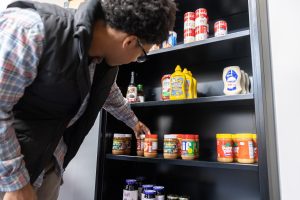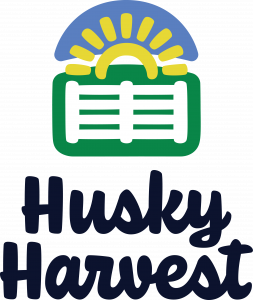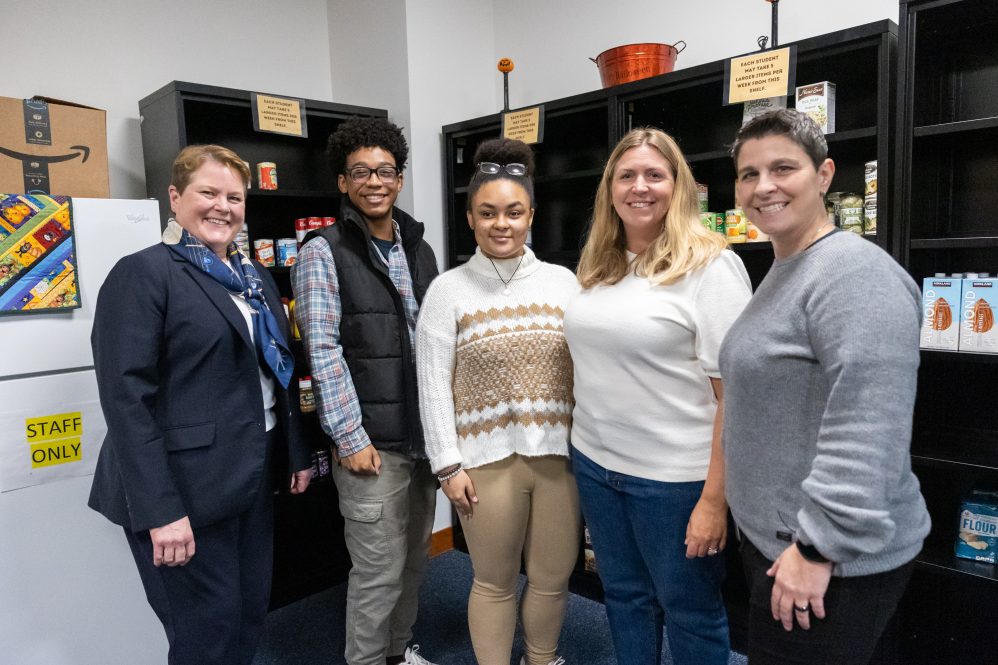Eden Davies has seen a stream of UConn Stamford students file through room 1.13 since September, when the food pantry that was a pop-up class project in the spring became a permanent fixture on campus.
“On the first day we were open, there was a student who came in here and he was so excited,” says Davies ’24 (CLAS). “He grabbed a bag, saw the sign that says ‘five items per week,’ and remarked about how expensive it is to buy things at retail. One of his friends looked at me and said, ‘Not a lot of us like to talk about high costs and skipping meals because you don’t want to tell people your struggles.’ That’s the reason we have this.”
At UConn Stamford and the University’s three other regional campuses, the fight against food insecurity and its stigma has prompted the creation of Husky Harvest, an initiative started this fall with Connecticut Foodshare to help those Huskies most in need.

The effort at UConn Stamford is further along than at the other campuses, thanks to associate professor-in-residence Laura Bunyan who started the pantry in the spring as a class project, opening three days a week with items from the Food Bank of Lower Fairfield County Inc. and other providers.
Today, Bunyan, who teaches sociology, has a team of helpers in a converted conference room down the hall from where she started, including nearly a dozen student workers and a co-director in Rosa Rizzo, who usually works in operations at the campus.
The extra help is necessary, especially now – Stop & Shop, after hearing about the pop-up pantry, provided $7,500 in gift cards to buy needed items; Unilever has offered a few hundred boxes of body wash and deodorant; and an anonymous donor gave $5,000 to help make purchases.
The Food Bank of Lower Fairfield County continues to be a source of food for the pantry, and Liz Sue Bagels Inc. in Stamford donates dozens of bagels – almost too many to count – weekly.
“With the bagels, we just went for it,” Bunyan says. “We put them out on the main concourse with napkins and paper bags. If people want to take a couple, great. Some say they feel weird taking more than one, but that’s what they are there for. If you want to eat one right now, go for it. If you want to take a bag home for the week, that’s great too.”
What they couldn’t offer, Bunyan says, is cream cheese or anything else to flavor the bagels. And that’s where donors, who can provide bulk items from warehouse stores that the pantry itself can’t source, are most needed.
“Students love cereal and pancake mix, which we can usually get. What we have a hard time supplying is syrup and shelf-stable milk of different kinds, like oat and soy,” Bunyan says. “Donations are down right now. It could be because it’s expensive for everyone. A lot of our students have larger family needs and family stresses, that’s coming across to us. And those are only the ones who are talking about it, not everyone is.”
Six Years in the Making at UConn Hartford
The effort to locate a pantry at UConn Hartford has been long in the making, says Associate Campus Director Nadine Brennan; six years to be precise, with three close but ultimately unsuccessful tries to arrange for something permanent.
“This is one of the things I’ve been fighting for and am so passionate about,” she says. “This need is just growing. Unfortunately, it’s not shrinking.”
After each attempt at something permanent, campus leaders, she says, tried stop-gap measures to help students – offering pizza at events and breakfast during finals, for example. And through the years, some faculty and staff members have even reached into their own wallets to help individual students.
That wasn’t enough, though.
“I’m feeling very grateful and thankful the leadership of the University is taking this to heart and doing something to help students in this regard,” Brennan says. “All the barriers students are up against are real. We talk about workforce development, and that’s important, but the reality is we have to get students through school first. We can’t let low-income students take out loans, then flunk out of school because they’re hungry.”
Brennan credits the UConn Rudd Center for Food Policy & Health, Senior Vice Provost for Academic Affairs Jeffrey Shoulson, and Sally Reis, special advisor to Interim Provost Anne D’Alleva, with taking a special interest in shepherding through the effort across the regional campuses.
In Hartford, she notes that Campus Director Mark Overmyer-Velazquez has been instrumental in helping to develop a fitting space for the pantry – on the ground floor, just off the elevator in a private area. For those who want anonymity, there’s a hallway that will offer an egress away from throngs of people.
“I am thrilled to know we are partnering with Connecticut Foodshare and that our students will have access to food,” Brennan says. “Getting to this point has been a challenging and now rewarding experience for me. I deeply care for our students and know that it is a privilege to have a hand in their academic success by providing them access to food.”
Connecticut Foodshare CEO: ‘We want our pantries to be warm, welcoming places’
Under the agreement with Connecticut Foodshare, UConn will become one of the nonprofit’s partner agencies, eligible to get food just the same as 600 other groups statewide, Connecticut Foodshare President and CEO Jason Jakubowski ’99 (CLAS), ’01 MPA says.
“They also will be able to tap into our knowledge of best practices around setting up a pantry. There are a lot of health and safety regulations, and there is a lot of outreach,” he says. “We want our pantries to be warm, welcoming places for people to come and be able to get the food they need, which is why I love the name Husky Harvest.”

Leaders at each regional campus are learning how to use the computer system to order food and set up a schedule to receive deliveries, he explains. They’re also learning how to connect people to SNAP benefits and a bit about the nutritional component of keeping a pantry.
The process for that is ongoing and the hope is to have all the pantries online before the spring semester, he says.
Connecticut Foodshare already has partnerships with most of the institutions in the Connecticut State Colleges and Universities system, and while the state legislature only recently started requiring public entities of higher education to report food insecurity numbers, Jakubowski says that requiring campus pantries likely was next.
“There’s a high number of people who go hungry on college campuses and it shouldn’t be as shocking as it is,” he says. “This population is paying for their education, has limited time to work, and might have other expenses like housing or medical bills. When you put those things together, you realize that unless you’re living on campus and have a meal plan, you’re likely to be struggling with food insecurity.”
He adds, “We’re very excited about this and I’m very excited about this personally. To do this anywhere is always terrific, to do this at my alma mater is extra special.
“What makes this even more gratifying is knowing that people have been working on this behind the scenes for the last several years,” he says. “This has not been something that materialized overnight. We’ve talked about this with administrators, we’ve talked about it with the trustees. We’re finally at the point that President Radenka Maric has come out and said this is what we’re doing. We’re making a commitment to help our students who are struggling with food insecurity.”
UConn Avery Point Hoping for Partners
UConn Avery Point Director of Campus Operations Janene Vandi says she expects undergraduate and graduate students especially – by virtue of who they are, how much they’re studying, and what they’re earning – to take advantage of the pantry once it opens in the Community Professional Building on the Groton campus.
“We’re going to open modestly three or four times a week and see what the need is,” Vandi, who also serves as the associate campus director, says. “We have a lot of first-generation students who are bound to our area and must work a lot of hours to bring money home to their families. We hear that families are struggling, and we do anticipate there will be a good number of students who rely on the resources here.”
Dining services does have a cafeteria on campus, Vandi notes, but “sometimes a $10 meal, five days a week stretches a person’s budget.”
The Connecticut Foodshare partnership will provide items for people to take home and make a meal – think pasta and sauce, rice and beans, peanut butter and jelly. But Vandi hopes to have a grab-and-go section with granola bars and yogurt to fill in the gaps between meals. It’s an effort that will come from the campus and wider community as those items can’t be sourced from Connecticut Foodshare.

“I’ve had a lot of faculty and staff who’ve started to hear about Husky Harvest and ask how they could help. We’re either going to take their items or their dollars and convert them into grab-and-go, so when a student or member of the faculty or staff goes into the pantry and they’re hungry, right away they’ll have something to get them home to their families so they can prepare the meal that Connecticut Foodshare is providing.”
And while UConn Stamford has bagels, UConn Avery Point hopes to partner with Research Vessel Connecticut, which takes University researchers and other groups out to sea for weeks at a clip and oftentimes docks for the winter with a modest supply of unused food.
“They can’t take it home and they don’t want to throw it away,” Vandi says. “They’ve struggled with what to do with the leftovers. It would be one more unique thing we can contribute to the food pantry because of where our campus is and what it does.”
A Population at UConn Waterbury That Will Really Benefit
UConn Waterbury Interim Associate Director Christine Scott-Dougan says the food pantry also will bear its own thumbprint when it opens – Day 1 will feature a farmers market-style lobby full of food meant to announce the opening in a grand way and welcome Huskies to take advantage.
“We recognize the need of the student population on campus,” she says. “Many come from financially disadvantaged families: 84% of our students receive some form of aid and 55% receive need-based grants, which is the highest of any campus. Many of our students take public transportation to get here and come from as far away as New Haven and Bridgeport. We have a population of students who will really benefit from this.”
After its opening, the pantry will settle into a permanent home in the Rectory Building, on the main floor in the back of Spirit Café. Scott-Dougan says organizers understand they’ll have to be deliberate in the food they request from Connecticut Foodshare, namely because it may travel many miles on a bus without refrigeration, before arriving home.
She’s also still trying to figure out some logistics – for instance, whether students should email a list of requested items so they can be bagged and waiting for them, or whether they would feel comfortable just visiting Husky Harvest on their own.
Time will tell, but if the success of Spirit Café, itself, is any indication, the pantry will be a success.
In the spring, Spirit Café opened a few times a week in the former Starbucks in the Rectory Building, Scott-Dougan says. An offshoot of an internet café on Bank Street around the corner, the campus location offered subsidized meals for students – a sandwich, chips, and a drink for $5.
This semester, it’s expanded to four days a week from 8 a.m. to 7 p.m., and “students are over there all the time, talking and engaging. It’s become something we really wanted that space to be,” she says.
Soon with the pantry – and a plan to connect users with additional food assistance closer to where they live – the café will embody the full spirit of the campus.
“The faculty and staff at UConn Waterbury are so committed to helping our students in and out of the classroom and come together to dedicate their time whenever they are called upon to do so. This has never been truer than with the food pantry,” Scott-Dougan says.
Contributions to the Regional Campus Food Insecurity Fund at the UConn Foundation can be made online. To contribute food or money specifically to Husky Harvest at UConn Stamford, visit the pantry’s Amazon wish list or visit its website.



